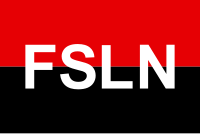Sandinista Ulusal Kurtuluş Cephesi
(Sandinist sayfasından yönlendirildi)
Sandinista Ulusal Kurtuluş Cephesi (İspanyolca: Frente Sandinista de Liberación Nacional, FSLN), Nikaragua'daki demokratik sosyalist bir siyasi partidir.[8][9]
Sandinista Ulusal Kurtuluş Cephesi Frente Sandinista de Liberación Nacional | |
|---|---|
| Genel başkan | Daniel Ortega |
| Genel Başkanvekili | Rosario Murillo |
| Kurucu | Carlos Fonseca |
| Kuruluş tarihi | 19 Temmuz 1961) |
| Merkez | Managua, Nikaragua |
| Gazete(ler) | El Pueblo Presidente La Voz del Sandinismo |
| İdeoloji | Sandinismo Demokratik sosyalizm[1] Sol milliyetçilik 21. yüzyıl sosyalizmi Sol popülizm Hristiyan sosyalizmi[2][3][4] Kurtuluş teolojisi Tarihsel: Marksizm-Leninizm Devrimci sosyalizm Anti-emperyalizm |
| Siyasi pozisyon | Sol Tarihsel: Aşırı sol |
| Dini | Hristiyanlık |
| Uluslararası üyelik | São Paulo Forumu Sosyalist Enternasyonal Müttefikler: Tarihsel: |
| Millî Meclis | 75 / 90
|
| Parti bayrağı | |
 | |
| İnternet sitesi | |
| www.elpueblopresidente.com | |
| Nikaragua | |
Parti; Carlos Fonseca, Tomas Borge, Silvio Mayargo önderliğinde 19 Temmuz 1979 tarihinde Nikaragua'da Anastasio Somoza Debayle diktatörlüğünü devirdi. İsmini 1927 yılında ABD Deniz Piyadelerinin Nikaragua'ya müdahalesi üzerine yandaşları ile dağa çıkarak ABD karşıtı silahlı eylemler ile halkın sempatisini kazanan Augusto César Sandino'dan almaktadır.[10] Üyeleri Sandinist olarak adlandırılır. Günümüzde Nikaragua'da iktidar partisidir.
Ayrıca bakınız
değiştirKaynakça
değiştir- ^ "Nicaragua Twenty-five Years Later | Solidarity". Solidarity-us.org. 19 Temmuz 1979. 24 Eylül 2015 tarihinde kaynağından arşivlendi. Erişim tarihi: 18 Ağustos 2014.
- ^ Redacción Central (29 Nisan 2011). "Daniel: la unidad es fundamental para el proyecto Cristiano, Socialista y Solidario – LVDS". Lavozdelsandinismo.com. 2 Nisan 2016 tarihinde kaynağından arşivlendi. Erişim tarihi: 18 Ağustos 2014.
- ^ Redacción Central (24 Aralık 2012). "Rosario: Queremos la unión de Nicaragua entera alrededor del Cristianismo, el Socialismo y la Solidaridad – LVDS". Lavozdelsandinismo.com. 5 Nisan 2016 tarihinde kaynağından arşivlendi. Erişim tarihi: 18 Ağustos 2014.
- ^ Redacción Central (13 Mart 2013). "Celebró Rosario en nombre del pueblo y el gobierno elección del papa Francisco – LVDS". Lavozdelsandinismo.com. 3 Nisan 2016 tarihinde kaynağından arşivlendi. Erişim tarihi: 18 Ağustos 2014.
- ^ "Orta Amerika'da PLO ve İsrail" (PDF). The PLO and Israel in Central America: The Geopolitical Dimension. RAND Corporation. 9 Ağustos 2024 tarihinde kaynağından arşivlendi (PDF). Erişim tarihi: 8 Ağustos 2024.
- Particularly close ties were established between the Sandinistas and the Popular Front for the Liberation of Palestine (PFLP). The global revolutionary aims of the PFLP, which was founded by a radical Marxist, Dr. George Habash, created a natural affinity with the Sandinistas.
- In February of that year, Benito Escobar again met in Mexico City with a PLO representative, Issam Sli, a member of the Democratic Front for the Liberation of Palestine (DFLP) and, according to the US State Department, "the Latin American liaison of the PLO."
- The extent of these relations was most recently demonstrated by reports that al-Fatah, the PLO member group founded and led by Arafat, was using Nicaraguan aircraft to ferry men and weapons to Lebanon from PLO bases in North Yemen.
- ^ "Latin Amerika'daki Terörist Gruplar". Terrorist Groups in Latin America: The Changing Landscape. InSight Crime. 7 Nisan 2014. 7 Ağustos 2024 tarihinde kaynağından arşivlendi. Erişim tarihi: 8 Ağustos 2024.
- One of the FARC’s staunchest supporters for more than 20 years has been Nicaraguan president Daniel Ortega. The alliance was first formed in the 1970s, when Ortega led the Sandinista revolution that succeeded in taking power in Nicaragua in 1979. Throughout his first presidency (1979-1990) Ortega was at the center of the revolutionary movements active throughout Latin America, in part because Nicaragua was the one state besides Cuba in the hemisphere where a violent, Marxist revolution triumphed. As a result, Ortega maintained close ties with revolutionary regimes and movements across the globe, including the FARC, when he was re-elected president in 2006.
- ^ "Ortega, FARC ile "İzinsiz" Konuşmakta Israr Ediyor". Ortega Insiste En Hablar Con Las FARC "Sin Permiso". El Pais. 21 Temmuz 2008. 21 Aralık 2022 tarihinde kaynağından arşivlendi. Erişim tarihi: 8 Ağustos 2024.
- El presidente de Nicaragua, Daniel Ortega, recalcó ayer que "para luchar por la paz no tenemos que pedirle permiso a nadie" y aseguró que la guerrilla de las Fuerzas Armadas Revolucionarias de Colombia (FARC) también quiere trabajar por la paz.
- Ortega afirmó en su discurso que ha encontrado "disposición del secretariado de las FARC para trabajar en favor de la paz" en Colombia, sin mencionar cómo se le ha transmitido esa voluntad. "Yo les digo a los hermanos de las FARC que nosotros estamos dispuestos a dialogar y conversar para trabajar por la paz en Colombia, porque bien se la merece ese pueblo y los pueblos latinoamericanos y caribeños", dijo el líder sandinista.
- ^ Richard Collin; Pamela L. Martin (2012). An Introduction to World Politics: Conflict and Consensus on a Small Planet. Rowman & Littlefield. ss. 218-. ISBN 978-1-4422-1803-1. 26 Aralık 2018 tarihinde kaynağından arşivlendi. Erişim tarihi: 18 Temmuz 2013.
- ^ "Nicaragua Twenty-five Years Later". Solidarity-us.org. 19 Temmuz 1979. 24 Eylül 2015 tarihinde kaynağından arşivlendi. Erişim tarihi: 18 Nisan 2013.
- ^ History Matters "To Abolish the Monroe Doctrine": Proclamation from Augusto César Sandino 23 Ekim 2017 tarihinde Wayback Machine sitesinde arşivlendi. Retrieved 29/09/12